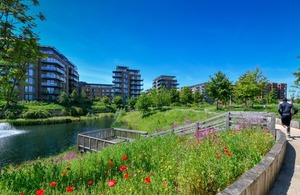Biodiversity Net Gain moves a step closer with more funding
Organisations are also encouraged to apply if they would like to be ‘responsible bodies’ for new conservation legal agreements

Kidbrooke Village which is being developed by Berkeley Homes, adopted the Biodiversity Net Gain principles on a voluntary basis. The site includes species-rich meadows and wetland with benefits for wildlife and local residents alike.
New nature positive developments moved a step closer today with additional government support announced to enable the rollout of Biodiversity Net Gain.
Many housing developers are already successfully operating Biodiversity Net Gain recognising the benefits for people and nature. From later this year, it will be mandatory meaning all major developments will required to deliver a 10% benefit for nature.
Biodiversity Net Gain was introduced through the world-leading Environment Act and is a key part of the government’s commitment to halt species decline by 2030. By mandating the creation of new habitat and green spaces when building new housing, commercial or infrastructure developments, we will be able deliver the beautiful homes that the country’s needs – benefitting people and nature.
To help the roll out, over £9 million of funding is being committed today to help local authorities recruit additional ecologists and specialists – creating the new green jobs of the future. This will help local authorities better safeguard and enhance habitats during the development process.
Trudy Harrison Nature Minister said:
Biodiversity net gain will bring nature closer to where people live, creating greener and more beautiful communities. Today’s funding and guidance is the next step towards delivering this important part of our Environment Act, which will come into force later this year. This will support green jobs across the country and unlock further investment in nature’s recovery.
From today, relevant organisations are also encouraged to apply from today for ‘responsible body status’ to allow them to enter into conservation covenant agreements with landowners.
Conservation covenants are a new type of legal agreement which will help secure the conservation of natural and heritage features of our landscape, including but not limited to the delivery of offsite Biodiversity Net Gain. To take part organisations will need to check they are eligible on the published criteria and apply to Defra for recognition. Covenants will be entirely voluntary agreements proposed by willing landowners.
Rob Perrins, Chief Executive, Berkeley Group, said:
Biodiversity net gain will be an important step forward for our industry, ensuring new developments support nature’s recovery and create the healthy and sustainable places local communities need. Putting this into practice on 54 sites has been a hugely positive experience for Berkeley Group and we know that the benefits far outweighed the challenges involved.
Today’s announcement will provide greater certainty ahead of the go live date in November and we will continue to work in partnership with Defra, Natural England and our local authorities to make biodiversity net gain a success.
Biodiversity Net Gain will exclusively apply to new applications for planning permission with the exact date to be confirmed in due course.
Further information:
Biodiversity Net Gain
- We have confirmed 9.61m this financial year to April 2024. This adds to the 6.16m announced in February to a total of 15.76m over the transition period.
- Biodiversity improvements on-site will be encouraged, but in circumstances where they are not possible, developers will be able to pay for improvements on other sites elsewhere by purchasing “units” via a private, off-site market or as a last resort from a government scheme. The price list for this Biodiversity Net Gain statutory biodiversity credit scheme has also been published today. A Biodiversity Gain Sites Register, which will record off-site biodiversity gains and their allocation to developments, will launch in November.
-
The price list for the Biodiversity Net Gain statutory biodiversity credit scheme has been published here. Statutory biodiversity credits are the last resort option for developers when delivering their biodiversity net gain and will complement off-site net gain in delivering strategic habitat creation across England. Prices are set purposefully above anticipated private market prices for biodiversity units, to avoid undercutting the market. Prices are set by Defra. Natural England will sell credits on behalf of the Secretary of State.
-
To be eligible to purchase statutory biodiversity credits a developer must provide evidence to the Local Planning Authority that on-site and off-site options are not available. Revenue from the sale of credits will be used to run the scheme and invest in habitat delivery in England.
-
The statutory credits sales service will launch when biodiversity net gain becomes mandatory and guidance will be published before BNG becomes mandatory across England.
- When biodiversity net gain becomes mandatory, it will require the statutory metric to be used. There will be a transitional period where Natural England’s existing biodiversity metric 4.0 will be accepted by local authorities and the biodiversity gain site register. The statutory metric will become available once laid in Parliament in November. The statutory metric will be published on Gov.uk with the statutory metric calculation tool available to download from Natural England’s Access to Evidence page.
Conservation covenants
- Conservation covenants are voluntary agreements that will help secure the
- Once designated, responsible bodies will be able to work with landowners to agree covenants that support delivery of nature recovery in the longer term.
- Conservation covenants will help deliver off-site biodiversity net gain as an alternative to existing planning obligations.
- Defra is encouraging organisations with a conservation focus to apply to become responsible bodies and we expect the first responsible bodies to be designated later in the year.